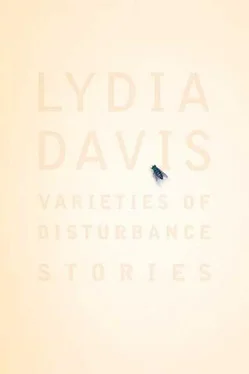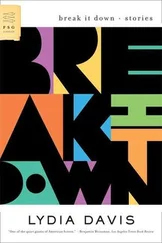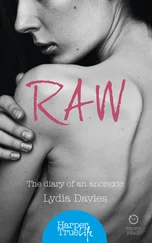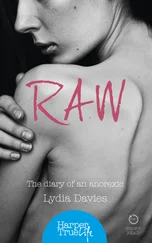Excitable
A woman was depressed and distraught for days after losing her pen.
Then she became so excited about an ad for a shoe sale that she drove three hours to a shoe store in Chicago.
Phlegmatic
A man spotted a fire in a dormitory one evening, and walked away to look for an extinguisher in another building. He found the extinguisher, and walked back to the fire with it.
Many people treat their five senses with a certain respect and consideration. They take their eyes to a museum, their nose to a flower show, their hands to a fabric store for the velvet and silk; they surprise their ears with a concert, and excite their mouth with a restaurant meal.
But most people make their senses work hard for them day after day: Read me this newspaper! Pay attention, nose, in case the food is burning! Ears! — get together now and listen for a knock at the door!
Their senses have jobs to do and they do them, mostly — the ears of the deaf won’t, and the eyes of the blind won’t.
The senses get tired. Sometimes, long before the end, they say, I’m quitting — I’m getting out of this now.
And then the person is less prepared to meet the world, and stays at home more, without some of what he needs if he is to go on.
If it all quits on him, he is really alone: in the dark, in silence, numb hands, nothing in his mouth, nothing in his nostrils. He asks himself, Did I treat them wrong? Didn’t I show them a good time?
Now, during the time he is dying, can I say, “This is where he lives”?
If someone asks me, “Where does he live?” should I answer, “Well, right now he is not living, he is dying”?
If someone asks me, “Where does he live?” can I say, “He lives in Vernon Hall”? Or should I say, “He is dying in Vernon Hall”?
When he is dead, I will be able to say, in the past tense, “He lived in Vernon Hall.” I will also be able to say, “He died in Vernon Hall.”
When he is dead, everything to do with him will be in the past tense. Or rather, the sentence “He is dead” will be in the present tense, and also questions such as “Where are they taking him?” or “Where is he now?”
But then I won’t know if the words “he” and “him” are correct, in the present tense. Is he, once he is dead, still “he,” and if so, for how long is he still “he”?
People may say “the body” and then call it “it.” I will not be able to say “the body” in relation to him because to me he is still not something you would call “the body.”
People may say “his body,” but that does not seem right either. It is not “his” body because he does not own it, if he is no longer active or capable of owning anything.
I don’t know if there is a “he,” even though people will say “He is dead.” But it does seem correct to say “he is dead.” This may be the last time he will still be “he” in the present tense. Or it will not be the last time, because I will also say, “He is lying in his coffin.” I will not say, and no one will say, “It is lying in the coffin,” or “It is lying in its coffin.”
I will continue to say “my father” in relation to him, after he dies, but will I say it only in the past tense, or also in the present tense?
He will be put in a box, not a coffin. Then, when he is in that box, will I say, “That is my father in that box,” or “That was my father in that box,” or will I say, “That, in the box, was my father”?
I will still say “my father,” but maybe I will say it only as long as he looks like my father, or approximately like my father. Then, when he is in the form of ashes, will I point to the ashes and say, “That is my father”? Or will I say, “That was my father”? Or “Those ashes were my father”? Or “Those ashes are what was my father”?
When I later visit the graveyard, will I point and say, “My father is buried there,” or will I say, “My father’s ashes are buried there”? But the ashes will not belong to my father, he will not own them. They will be “the ashes that were my father.”
In the phrase “he is dying,” the words “he is” with the present participle suggest that he is actively doing something. But he is not actively dying. The only thing he is still actively doing is breathing. He looks as if he is breathing on purpose, because he is working hard at it, and frowning slightly. He is working at it, but surely he has no choice. Sometimes his frown deepens for just an instant, as though something is hurting him, or as though he is concentrating harder. Even though I can guess that he is frowning because of some pain inside him, or some other change, he still looks as though he is puzzled, or dislikes or disapproves of something. I’ve seen this expression on his face often in my life, though never before combined with these half-open eyes and this open mouth.
“He is dying” sounds more active than “He will be dead soon.” That is probably because of the word “be”—we can “be” something whether we choose to or not. Whether he likes it or not, he “will be” dead soon. He is not eating.
“He is not eating” sounds active, too. But it is not his choice. He is not conscious that he is not eating. He is not conscious at all. But “is not eating” sounds more correct for him than “is dying” because of the negative. “Is not” seems correct for him, at the moment anyway, because he looks as though he is refusing something, because he is frowning.
Beyond the hand holding this book that I’m reading, I see another hand lying idle and slightly out of focus — my extra hand.
I find a small caterpillar in my bed in the morning. There is no good window to throw him from and I don’t crush or kill a living thing if I don’t have to. I will go to the trouble of carrying this thin, dark, hairless little caterpillar down the stairs and out to the garden.
He is not an inchworm, though he is the size of an inchworm. He does not hump up in the middle but travels steadily along on his many pairs of legs. As I leave the bedroom, he is quite speedily walking around the slopes of my hand.
But halfway down the stairs, he is gone — my hand is blank on every side. The caterpillar must have let go and dropped. I can’t see him. The stairwell is dim and the stairs are painted dark brown. I could get a flashlight and search for this tiny thing, in order to save his life. But I will not go that far — he will have to do the best he can. Yet how can he make his way down to the back door and out into the garden?
I go on about my business. I think I’ve forgotten him, but I haven’t. Every time I go upstairs or down, I avoid his side of the stairs. I am sure he is there trying to get down.
At last I give in. I get the flashlight. Now the trouble is that the stairs are so dirty. I don’t clean them because no one ever sees them here in the dark. And the caterpillar is, or was, so small. Many things under the beam of the flashlight look rather like him — a very slim splinter of wood or a thick piece of thread. But when I poke them, they don’t move.
I look on every step on his side of the stairs, and then on both sides. You get somewhat attached to any living thing once you try to help it. But he is nowhere. There is so much dust and dog hair on the steps. The dust may have stuck to his little body and made it hard for him to move or at least to go in the direction he wanted to go in. It may have dried him out. But why would he even go down instead of up? I haven’t looked on the landing above where he disappeared. I will not go that far.
Читать дальше












